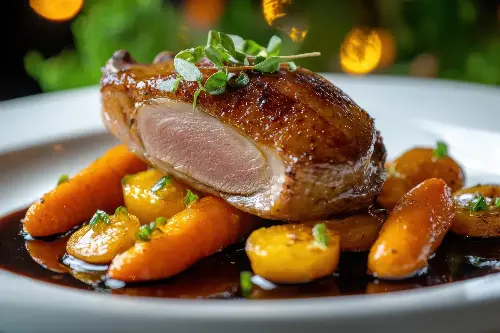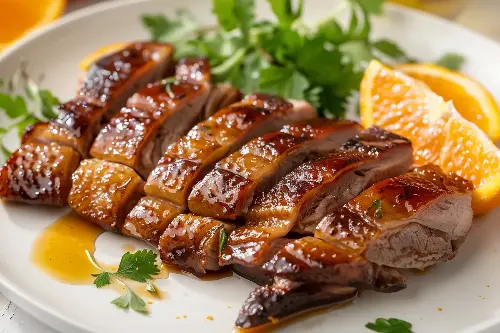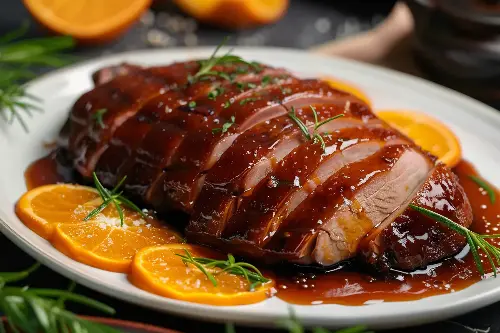Imagine a dish that gracefully dances across the palate, balancing the richness of perfectly roasted meat with the bright, zesty notes of citrus fruit – this is duck à l'orange. An enduring classic of French cuisine, this dish remains a beloved staple on dining tables around the world, not merely for its delicious taste but its timeless elegance as well. The melding of sweet and savoury elements within duck à l'orange encapsulates a culinary tradition that transcends cultural boundaries and continues to inspire chefs and food lovers alike.

The Origins of Duck à l'Orange
Tracing the roots of duck à l'orange leads us back to the opulent tables of Renaissance Europe. While the exact origins are debated, what's clear is that this dish has evolved through centuries. The often-told tale credits its conception to the Medici court of Florence, Italy. Over time, the recipe crossed borders and was refined by French culinary masters, becoming a shining jewel in the crown of French cooking.
In France, duck à l'orange became popularised in the 19th century, especially during the reign of Louis XV. What was once an aristocratic delicacy eventually found its way into the bistros of Paris and, later, the global stage. Today, various iterations of this sumptuous dish can be found from upscale dining establishments to the kitchens of home cooks who aspire to recreate the magic of this classic recipe.
A Symphony of Flavours
The true beauty of duck à l'orange lies in its complexity of flavours. The dish is traditionally made using a whole duck, which is seasoned and roasted to glorious perfection. The skin becomes crisp and golden, while the meat underneath remains tender and moist. Oranges, the star player in this epicurean drama, are not merely an afterthought. They provide both the unmistakable citrus flavour and an exquisite sauce that when paired with the duck creates a gustatory experience unlike any other.
To achieve the magnificent balance, the oranges are typically segmented and the juice is used to make the sauce, into which finely julienned orange zest, sugar, wine vinegar, and Grand Marnier or a similar orange liqueur are incorporated. The result is a glossy, rich sauce that is drizzled over the sliced duck before serving, creating a vibrant contrast both in colour and in taste.

Cultural Culinary Exchange
Though its roots are embedded in European cuisine, duck à l'orange exemplifies how a dish can become a worldwide phenomenon. The powerful simplicity of its flavour pairing has made it malleable to different culinary traditions. In Chinese cuisine, for example, flavours similar to duck à l'orange can be found in dishes that feature duck and hoisin or sweet bean sauce, served with mandarin pancakes.
In American cuisine, duck à l'orange had a moment of popularity during the mid-20th century, symbolising sophistication in home entertaining. It has continually served as a bridge bringing together the artistry of fine food and the joy of communal dining across various cultures and generations.
Health Benefits of Duck Meat
Adding to its appeal, duck meat is rich in nutrients. It is a substantial source of protein, vitamins, and minerals such as selenium, iron, and niacin. Duck meat is often considered a healthier alternative to red meat due to its lower saturated fat content. The coupling of duck with oranges, which are an excellent source of vitamin C, fibre, and antioxidants, elevates this dish as a wholesome yet indulgent culinary choice.
Modern Interpretations
The world of gastronomy is ever-evolving, and chefs continue to reimagine duck à l'orange, infusing new life and flavours into the age-old recipe. Some have experimented with different cooking techniques such as sous vide to ensure perfectly cooked duck every time, while others have played with the elements of the sauce, introducing new ingredients like star anise, cinnamon, or fresh herbs for an inventive twist.
Regardless of the interpretations, the classic preparation remains a firm favourite. It's a dish that respects tradition while allowing for innovation. For those who wish to replicate this iconic recipe at home, it offers an opportunity to hone cooking skills, indulge in luxurious flavours, and perhaps even start a new tradition at the dinner table.

Savouring the Tradition
Cooking duck à l'orange is an act of love as much as it is a culinary endeavour. It pays homage to intricate French cooking techniques and the value of quality ingredients. While its synthesis might seem overwhelming to some, the process of crafting the dish is a journey well worth taking, with each step closer to achieving culinary artistry.
As more people grow accustomed to dining on an eclectic mix of cuisines, duck à l'orange stands as a testament to the power of food to unite connoisseurs and casual diners alike. It is a dish that does more than feed the body; it feeds the soul, encapsulating centuries of tradition in each bite and creating an experience that lingers in memory long after the meal has ended.
Duck à l'orange, with its vibrant hues and luxurious taste, remains a celebration of flavour and tradition. It is a dish that invites us to explore the rich tapestry of culinary history and savour a recipe that has been loved for generations. It's not just food—it's a story on a plate, a narrative woven out of the threads of history, culture, and the universal love for a meal well made.
